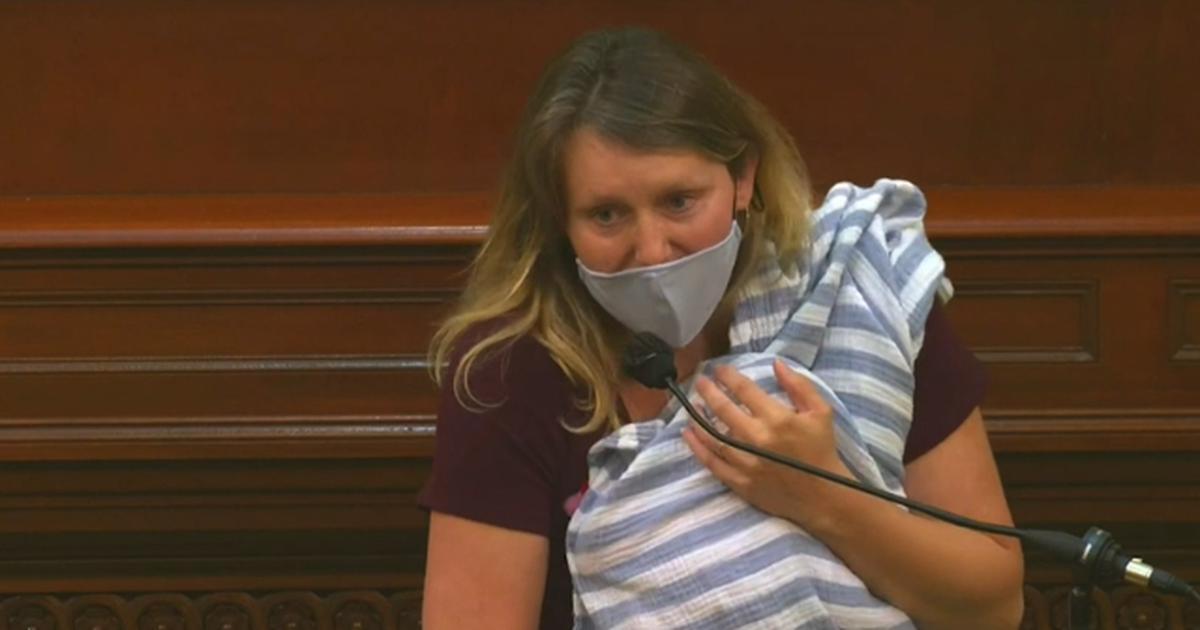
In the midst of a pandemic, a California lawmaker who had given birth just a month before cast her vote on a bill with her crying baby in her arms.
It didn’t have to be this way.
Assemblywoman Buffy Wicks had asked to be allowed to vote by proxy on a housing bill Monday, but her request was denied. The speaker of California’s State Assembly, Anthony Rendon, decided she would have to vote in person or not at all. Only those who are considered at higher risk of COVID-19 are allowed to have a legislative leader, a proxy, vote on their behalf, according to Assembly rules introduced in July. As a new mother, Wicks didn’t cut it in Rendon’s eyes.
Those who are pregnant are at an increased risk of getting COVID-19, according to the CDC. The agency doesn’t extend the same warning for people who’ve recently given birth, but postpartum complications could lead to other health issues that do put one at risk, writes Politico, which first reported on Wicks’ vote. Babies under two are at higher risk to contract the virus than older children, but it’s rare, according to the Mayo Clinic, a nonprofit medical center and research organization.
“I was actually in the middle of feeding my daughter when this bill came up and I ran down on the floor today because I strongly believe we need to pass this bill. We are 3.5 million homes shy of where we need to be,” Wicks said, as her daughter cried in her arms. “And Elly agrees.”
“Please, please, please pass this bill, and I’m gonna go finish feeding my daughter.”
The bill didn’t make it. But another one the Democrat voted for on Monday did. That one would expand the state’s paid family leave program if signed by Gov. Gavin Newsom.
Absolutely devastated about #SB1120. Our housing crisis requires us to act, and tonight we failed to do that.
But I promise you this: I will *always* show up for housing — no matter what. pic.twitter.com/I4n6X07CNp
— Buffy Wicks (@BuffyWicks) September 1, 2020
Rendon, a Democrat, was just following the Assembly’s rules, his spokesperson, Katie Talbot, told Politico in a statement. “The house resolution pertaining to proxy voting is very specific, in that only members at a higher risk from Covid-19 will be considered eligible for proxy voting,” she said.
“This bar of eligibility was always intended to be high, to ensure the protection of our legislative process.”
Mashable reached out to Wicks’ and Rendon’s respective offices for comment but received no response by the time of publication.
As Wicks is being commended for showing up with her newborn to make the vote — even by Hillary Clinton, no less (Wicks supported her presidential run) — there’s a deeper frustration here.
She shouldn’t have been forced to drive more than 80 miles from her Oakland home with her baby in tow to do it. She shouldn’t have had to stop feeding her one-month-old to run to the floor and vote. She shouldn’t have had to soothe a cranky baby as she pleaded with her colleagues.
Compassion and workarounds for new parents with few childcare options available is already lacking in America. Add poor interpretations of coronavirus rules to the mix and you tie parents’ hands even further. Wicks is a symbol of bigger childcare issues, ones that have only been exacerbated by America’s messy and feeble response to the coronavirus.
While Wicks wore a mask and patted her newborn in a striped blanket on the floor, Senate Republicans voted remotely after one of their members tested positive for coronavirus. Whether Wicks was at a higher risk was up to interpretation. She could’ve voted remotely, too.
Just one man decided that she couldn’t.
